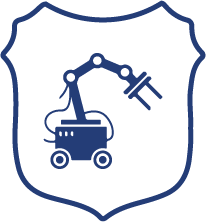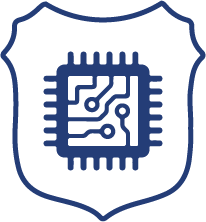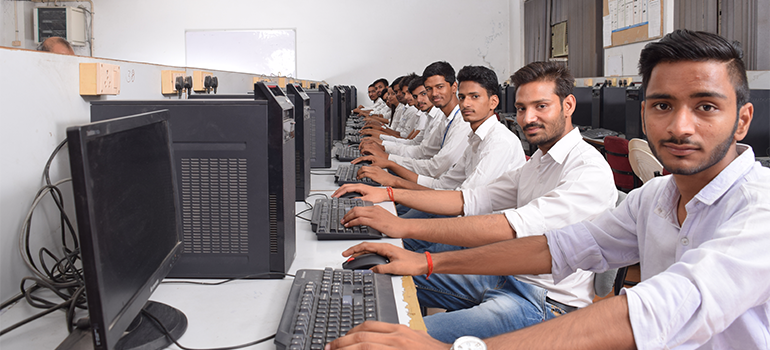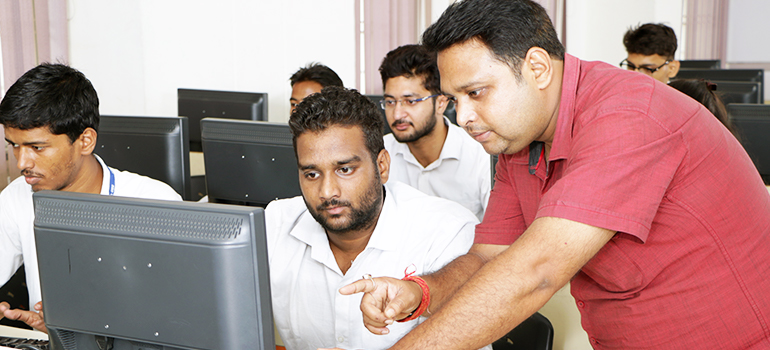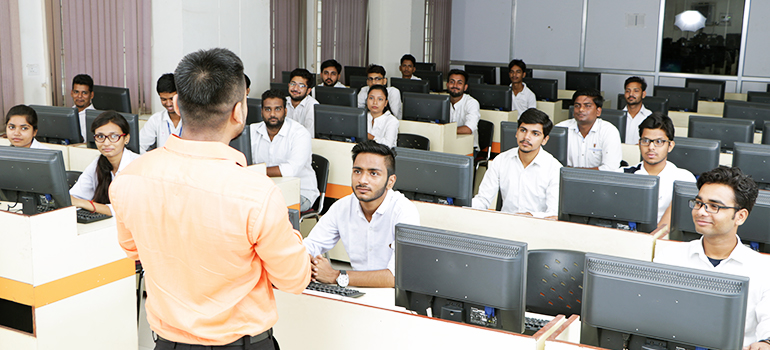B.Tech (Computer Science & Engineering)
Educational Objectives
With the advancement of engineering and, subsequently, technology, we have now moved in a world which cannot be imagined without computers, processors, chips, and other similar digitized gadgets. So much is the dependence on such modern machines that it is hard to digest that such technologies would have been considered a part of folklore a century ago.
But, post this development, today the demand for capable engineers belonging to the discipline of Computer Science is so high that technological giants are hiring thousands of engineers a year.
BBDU has always aimed to contribute to the elitist group of CS engineers (owing to which it is now reputed as Best Computer Science Engineering College in Lucknow) by facilitating its CS students with:
- Most modern labs and technologies;
- Very capable teachers and supporting faculty members, with respect to knowledge and education;
- Compulsory in-plant training and internships along with the course for understanding an on-field approach and application of knowledge;
- Access to international research papers and journals for better learning and much deeper understanding.
Opportunities For Computer Science Engineers
There are thousands of computer engineering jobs available in the market based on the skills and qualification. The booming IT sector in India has created a variety of job opportunities for computer science engineers. If you have done CSE then you can easily grab a nice IT job in an MNC. In IT firms, you can work in departments like design, testing, assembly, maintenance, and manufacturing. Following are some positions that serve as great options for a career after computer science engineering:
- Application analyst.
- Applications developer.
- Data analyst.
- Database administrator.
- Games developer.
- Multimedia programmer.
- Software engineer
- Systems analyst
- Web designer/Web developer
- Programmer/Software Tester
- Cloud Engineer
Program Outcomes
- Engineering Knowledge: Apply the knowledge of mathematics, science, engineering fundamentals and an engineering specialization to the solution of complex engineering problems.
- Problem Analysis: Identify, formulate, review literature and analyze complex engineering problems reaching substantiated conclusions using first principles of mathematics, natural science and engineering sciences.
- Design / Development of Solutions: Design solutions for complex engineering problems and design system components or processes that meet the specified needs with appropriate consideration for the public health and safety and the cultural, societal and environmental considerations.
- Conduct Investigations of Complex problems: Use research based knowledge and research methods including design of experiments, analysis and interpretation of data, and synthesis of the information to provide valid conclusions.
- Modern Tool Usage: Create, Select, and apply appropriate techniques, resources and modern engineering and IT tools including prediction and modeling to complex engineering activities with an understanding of the limitations.
- The Engineer and Society: Apply reasoning informed by the contextual knowledge to assess societal, health, safety, legal and cultural issues and the consequent responsibilities relevant to the professional engineering practice.
- Environment and Sustainability: Understand the impact of the professional engineering solutions in societal and environmental context and demonstrate the knowledge of, and need for sustainable development.
- Ethics: Apply ethical principles and commit to professional ethics and responsibilities and norms of the engineering practice.
- Individual and Team Work: Function effectively as an individual and as a member or leader in diverse teams and in multidisciplinary settings.
- Communication: Communicate effectively with the engineering community and with society at large. Be able to comprehend and write effective reports documentation. Make effective presentations, and give and receive clear instructions.
- Project management and finance: Demonstrate knowledge and understanding of engineering and management principles and apply these to one’s own work, as a member and leader in a team. Manage projects in multidisciplinary environments.
- Life-long learning: Recognize the need for, and have the preparation and ability to engage in independent and life-long learning in the broadest context of technological change.
Program Specific Outcomes
- Ability to apply fundamentals of Information Technology for Engineering Solutions in accordance with industrial demand using the domains of applied science, algorithms, databases, networking, security, machine learning and data analytics.
- Ability to employ modern computer languages with focus on open platforms to develop innovative solutions in the field of SMACS (social, mobile, analytics, cloud and security) with professional behavior and ethics.
Syllabus
Engineering Courses
Labs
-
- UNIX & Shell Programming
- Object Oriented Programming Lab
- Operating System Lab
- Database Management System Lab
- Data Structures Lab
- Algorithms Lab
-
- Artificial Intelligence Lab
- JAVA Lab
- Computer Networks Lab


